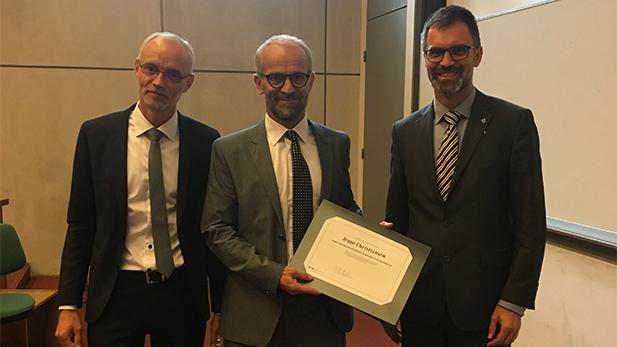What are the negative interest rates trying to tell us?

Adjunct professor Jeppe Christiansen with Head of Department Søren Hvidkjær (left) and Peter Møllgaard, Dean of Research.
Photo: Ida Willumsen.
Interest rates can be traced back all the way to 3000 BC and the current interest rates are the lowest ever. When Jeppe Christiansen, CEO of Maj Invest, presented the first graph in his slideshow during his inaugural lecture as adjunct professor, the long retrospect made the audience smile. The reason for using this overview was an attempt to investigate not only why we are experiencing negative interest rates, but also what the markets are trying to tell us? Jeppe Christiansen presented his guess at that on Friday, when he was appointed Adjunct Professor with the Department of Finance at CBS.
In his inaugural lecture, he gave the main reason for the fall in real interest rates: Increased savings.
”The period people live as retirees compared to the period they participate in the labour market is constantly changing so they need more savings. This factor is probably the very strongest of all factors particularly in Europe and Japan when looking at the reasons for the fall in interest rates,” said Jeppe Christiansen and argued against the idea that monetary policy after the financial crisis is the main reason:
”This fall runs deeper because it is part of a macroeconomic trend over many years with increased savings that are stressing interest rates.”
According to Jeppe Christiansen, one challenge is that the extent of investments is not increasing despite the fall in interest rates. Therefore, the fiscal policy is used to increase investments, but a country such as Greece has reached the limit for what it's possible to do, and Japan is near that limit now, explains Jeppe Christiansen. The monetary policy is the remaining instrument, and that is why we see such a focus on this specific form of financial policy today, he added.
But what will happen when the next recession hits?
”If we believe in a regular conjunctural policy, we will see a recession in two to three years. Since the year 1800 the world has moved in waves, and when we look back at these cycles, it is clear that in every recession, if you use the monetary policy to kick-start the economy, interest rates must be lowered,” he said, but also pointed to the widespread concern about negative interest rates that are far below zero.
”Do we need negative interest rates? I believe we do, but I am not sure whether it is wise,” Jeppe Christiansen said.
But what do we do, when we hit the bottom with an interest rate around zero, while we hit the fiscal policy ceiling because the national debt is so big that it cannot continue to grow without damaging trust? Jeppe Christiansen's answer was that we are now at a crossroad. Should we phase out bank notes to make the low interest rates possible? Do we need more bond purchases? Or should we work to increase inflation? He expects to see a variety of initiatives in the years to come.
In his closing, Jeppe Christiansen also reflected on what the markets are trying to tell us. One place to look for answers, he says, is in the price of gold. It has increased about 25 per cent this year.
”As we hear the rumble of negative interest rates, the price of gold is going up. That's interesting, because the last time it went up was two to three years before the financial crisis,” he said and argued that we should keep a general eye on the market.
”Because it reflects the actions of many investors.”
A focus on the markets is one of the things Jeppe Christiansen can contribute with at CBS.
”The markets are really doubtful that the monetary policy options are enough. That is the contribution from the real world to the department,” he said in conclusion, and received applause from the audience.
See the inaugural lecture (in Danish)
About Jeppe Christiansen
Jeppe Christiansen is a Master of Economics from the University of Copenhagen, 1985. In 2005, he founded Maj Invest and is CEO of the group, which now employs 100 people in asset management and private equity. Jeppe Christiansen also serves on the board of directors in a number of leading Danish companies, including Novo Nordisk A/S (vice chairman), Haldor Topsøe A/S (chairman), Kirkbi A/S, Novo A/S, and Symphogen A/S.
Jeppe Christiansen is already an active contributor to both educational and research activities at CBS. He serves on the Advisory Board for Finans/Invest, the leading Danish finance journal, as well as with the Center for Corporate Governance at CBS. Jeppe Christiansen is a founding member of and frequent contributor to the CBS Board Leadership Programs. Jeppe Christiansen also writes on financial and macro-economic issues as a columnist for the newspaper Berlingske Tidende.